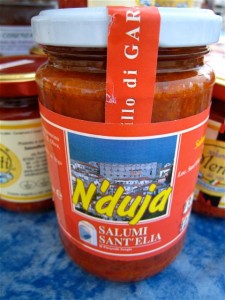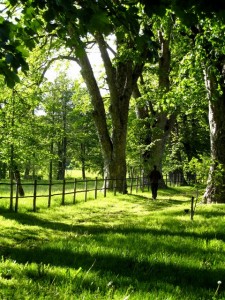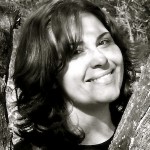Travellers Calabria Contest: Q and A with Travel Writer Lara Dunston Part 4 of 5
 Welcome to Day 4 of our Q and A with Travel Writer Lara Dunston! Previous installments:
Welcome to Day 4 of our Q and A with Travel Writer Lara Dunston! Previous installments:
Remember that I’m giving away FIVE copies of Lara and Terry Carter’s new guidebook, Travellers Calabria. See details here, but essentially you can comment every day this week for a chance to win Lara and Terry’s book.
And don’t forget to go back and comment on Sunday’s post for a chance to win a Calabrian CD by the group Marasà.
Now, my interview with Lara continues (all photos provided by Lara and Terry; remember you can hover over the photos for their descriptions):
7. Please help us live vicariously through you and walk us through your writing and research process for a guidebook.
If it’s a guidebook update, then the first thing we do is create an itinerary based on the content of the book.
If it’s a city guide and we’re renting an apartment in a city then we have to determine how we’re going to spend our days and nights for the next month or two so that we’re experiencing as many of the museums, sights, hotels, restaurants, bars, cafes etc as we can in the time available to do the research.
 If it’s a country and regional guide, then we create an itinerary that gets us to those places in the most logical way.
If it’s a country and regional guide, then we create an itinerary that gets us to those places in the most logical way.
If they’re small towns we might only have enough time to spend a day and night. If they’re small cities obviously we try to stay longer, two or three days.
For big cities, we might stay weeks. For a city guide we might spend a month or two in that city. For the Australia book we recently did we were on the road for 5.5 months, and that was just the research part!
We always try to do everything and we do as much as we can – and we will phone places we can’t visit or places that are closed due to the season or they’re being renovated or whatever. Publishers simply don’t pay writers enough money to allow them sufficient time to do absolutely everything unfortunately.
When we’re doing the actual update of a book, we’re checking the accuracy of the existing text, of its practicalities, its facts and its overall description. We’re constantly asking ourselves if the place we’re visiting or thing we’re experiencing looks and feels the way it was described, and we’re changing the text accordingly.
We’re also assessing whether places are worth keeping in, and if they’re not and we’re planning to remove them, then we’re looking for new places to put in.
Writing first edition books are much harder of course – and the Calabria book was a first edition – because you’re gathering as much information as you can from a whole variety of sources and bringing that all together. You’re visiting places, writing down your observations, talking to people, writing notes, taking photos, and then sitting down and looking at all your research material and writing the whole book from scratch.
When I’m writing, I’m constantly referring to my notebooks and my photos (my photo galleries are essentially my memory!), but I’m also emailing people to ask extra questions I didn’t have time to at the time, I’m consulting history books, books on the politics and society of a place, or books written by locals that I might have picked up on the road.
I’m double-checking details on hotel and tourism websites, if it’s a place we might have had a few doubts about then I’m also looking at other reviews to find out what other people’s experience was – but we have enough experience now to know whether a hotel or restaurant was having a bad day or whether they have serious problems.
 Once we submit the manuscript then the editing process I touched on above begins and the editor sends back AQs (author queries). Some book publishers, such as DK, (as well as some magazines) also take the text through a further stage, the fact-checking process, as well, so you might have questions that also come from a fact-checker as well as the editor.
Once we submit the manuscript then the editing process I touched on above begins and the editor sends back AQs (author queries). Some book publishers, such as DK, (as well as some magazines) also take the text through a further stage, the fact-checking process, as well, so you might have questions that also come from a fact-checker as well as the editor.
8. What were your best and worst travel writing experiences?
The best far outweigh the worst, that’s for sure. They include any book we’ve written on Italy – and we’ve written books on various regions of Italy for Footprint, Thomas Cook and Lonely Planet – simply because we love Italy so much.
Other books that were great fun to research were the Buenos Aires guidebook we did for LP (we rented an apartment there for over two months and fell deeply in love with the city, so much so that we’re planning to buy an apartment there – we just need to find the time to get down there to do that!), and also books for LP on Amsterdam, and on Brussels Bruges Antwerp and Ghent. They were also cities we had been to and knew, but we really became very intimate with them writing books.
We spent a month in Thailand updating a book for DK and as I had to write a new spread on spas we got to try out an awful lot of spa treatments – so how can you complain about that?
I can’t recall a book experience being bad because of the place, but rather because of the circumstances. For instance, when editors send you to research books in Europe in summer – which they always seem to do – it’s the worst time because it’s not only expensive and hard to get rooms but it’s so hot that it’s doubly-exhausting running around checking stuff out.
Doing books on the road in Australia can be hard because of the poor telecommunications – so many motels in outback towns don’t have internet access or if they do, it’s dial-up, which we can’t use without accounts (we haven’t lived in Australia for 11 years).
While every town in Australia has phone access, once you’re out of those towns, there’s no signal, so you can’t use your mobile phone for many hours on the road when you could be making calls to check stuff, and that’s very frustrating.
In Australia, which is where we wrote our last books, we also had problems associated with horrific weather, we got caught in floods in Alice Springs, hurricane-like winds in southern Western Australia, heatwaves in South Australia, and bushfires in Victoria… all of these things delay research, which delays the amount of time you spend on the book, and the longer you work on the book, the less money you ultimately make in the long run.
 And some editors have no concept of how long it takes to research a place – they don’t add up the miles and think things through. I remember asking one editor how long the writer took to research a chapter and she told me – well, it took us twice as long, and we were often driving between 500-700 kms a day! It would have been physically impossible to do it in the amount of time the previous writer did it – they obviously skipped a lot of places!
And some editors have no concept of how long it takes to research a place – they don’t add up the miles and think things through. I remember asking one editor how long the writer took to research a chapter and she told me – well, it took us twice as long, and we were often driving between 500-700 kms a day! It would have been physically impossible to do it in the amount of time the previous writer did it – they obviously skipped a lot of places!
Probably the worst experience for me was Greece for Lonely Planet, and not at all because of Greece – or Lonely Planet – but we were in Thessaloniki and we were just about to pick up a hire car to embark on a six week research trip around the mainland and Peloponnese when my sister called from Australia to say my mum had been hit by a car and was in a critical condition and in a coma.
Terry immediately contacted Lonely Planet and they were understanding and said go and take as long as we needed. We were very lucky and we were able to get on flights from Thessaloniki to Athens that morning, then Athens to Dubai in the afternoon, then Dubai to Perth the next day, and I was in intensive care with my mother 24 hours later. Once my mother was out of danger, albeit still in a coma, a couple of weeks later, we were driving around Greece updating the book.
That was the hardest book I’d ever had to do because I was constantly thinking about her, but at the same time we couldn’t let LP down, especially as they’d been so understanding, and Terry couldn’t do it on his own. My Mum ended up being okay, although she lost an eye and most of the use of an arm and still has difficulty walking, and had she have died while I was driving around Greece, I probably would have died.
Something aspiring writers need to keep in mind is that the most difficult thing about being a freelancer is that you don’t get sick leave, annual leave or compassionate leave, and you don’t always have sympathetic publishers.
We wrote and updated 25 books for Lonely Planet and while I am no great fan of theirs, especially now that they’re largely much owned by the BBC, they were very understanding and could be very good about how they treated their writers when it came to things like that.
That can’t be said about all publishers so writers need to carefully pick and choose who they want to work with, but of course you can’t know until you’ve worked for them. And I’m sure some publishers feel the same about writers!
How cool is this inside look into travel writing?
Be sure to come back tomorrow for the final installment, which will include Lara’s excellent advie to all you aspiring travel writers out there.
Be sure to leave your comment and tweet or post to Facebook to maximize your chances of winning a copy of Travellers Calabria! See contest details here.















All of these travel stories are getting me itchy for a trip to Southern Italy!
Hahaha, my master plan is working! 😉
I am so hoping that BA will be our next (and last) posting. Will have to check out Lara and Terry’s book.
Sounds great to me, Willym 🙂
.-= Willym´s last blog ..Finger Painting =-.
“Something aspiring writers need to keep in mind is that the most difficult thing about being a freelancer is that you don’t get sick leave, annual leave or compassionate leave, and you don’t always have sympathetic publishers.”
So true!!
Indeed.
.-= nyc/caribbean ragazza´s last blog ..A “sweet” surprise…”The Sweet Life in Paris” by David Lebovitz =-.
Lara’s love for Buenos Aires must have found expression in her guidebook about Buenos Aires. One of my blogger friends bought her guidebook and loved it very much!
The book and the city. Now she also dreams of having a pied a terre over there.
Hint: if I would win a copy of Lara’s guidebook about Calabria, you only need to send it across the hills to Vibo Marina 😉
Hee hee, noted Suzie, but the winners will be drawn randomly 😉
Amazing! All of the things to think about!! While I love Italy, I am curious – what was it about Buenos Aires that was so appealing – never been, but feel like I should add it to the travel list.
Enjoy Francesca!
Great article on the business side of things. Its always good to get a little dose of reality.
So true, Victor!
Francesca, if you love Italy, you’ll almost certainly love BA. Architecture, food, wine and a little something I now call ‘street feel’ (the sense of life on the streets) and a real love of life shown by the locals. It’s South America, looks a little like Paris (thanks to Haussmann-era architecture), but thankfully has coffee more like Italy. And — just to tie it in with Calabria — many of the Italian immigrants were from the South, so dishes such as pasta puttanesca are wonderful.
And I have not even mentioned tango or steak — the two most talked-about aspects of BA for lazy travel writers. The tango is ok (if mostly very touristy), but the steaks are something really special. The downsides are prolific pickpockets, the rather depressing way the poor have to earn a living there, and looking for ‘real tango’.
Thanks so much for coming by and sharing this, Terry!
It goes without saying that I’d just LOVE a copy of this book. I’ll have to go back and read ALL the installments in their correct order!! Thanks to the both of you!
Hee hee…be sure to comment on every post to increase your chances of winning 🙂
.-= My Melange´s last blog ..Roman Windows =-.
Yes that goes for me too!! would love a copy their book :-)…Would like to Thank Lara for the direct comment to me, about living out of a suitcase, pros and cons, and how things don’t really get easier, so Thank You Lara.
I am no writer, it takes me all my time to write a post, 🙂 …Thanks for sharing and also Thank you to Michelle, for inviting you to post here!!
So happy you’re enjoying the series Anne!
.-= anne´s last blog ..A Fun day out in Oxford….. =-.
I have never visited Italy but I am learning the language and hope to travel there next year. I plan to start exploring at the “toe of the boot” and work my way up. I would love to have a copy of Travellers Calabria to accompany me on my travels as I discover the region my beloved loved so much.
Aw, best of luck Sezzy!
This is such a fun week. I love the information, the writing style and the pics are fabulous!
.-= Jacquie Olsen´s last blog ..The Two Judgments =-.
Thanks everyone! Much appreciated. I’ll just say “ditto” to my husband and partner, Terry’s comments about Buenos Aires above! To add to that “street feel” he talks about, I also feel an emotion on the streets that I don’t feel in many other places other than Italy, Spain, and throughout the Arab world – an incredible thirst for life that is extreme, from deep passion and profound joy to a nostalgia and melancholia that always seems to be under the surface. Amazing people and amazing place.
.-= lara dunston´s last blog ..In print and online =-.
I hope that Lara will address where she and Terry do the actual writing. Do they return “home”? Where is that for them? Her sister’s house?
Wow. You could write a different kind of book with just all your great travel stories, the good, the bad and the ugly.
What a life though!
.-= Clayvessel´s last blog ..Get a Handle on It =-.
Well Australia – as THE poem goes … a sunburnt country of rugged mountain ranges and droughts and flooding plains! And we are are now adding the bushfires as well.
To think I was just about to wish … to do travel writing 🙂
The mark of a good travel writer though is one that even though landmarks may have changed, they have actually captured the essence of what it is like to be in a place, and they do give a sense of the history. Can’t wait to read the Calabria book – even though it might mean having to buy it 🙂
Jo
All caught up! I really cannot wait to get my hands on this book (as contest booty or otherwise!)… having all this intimate background on the writer(s) and the process makes this book even more intesting!